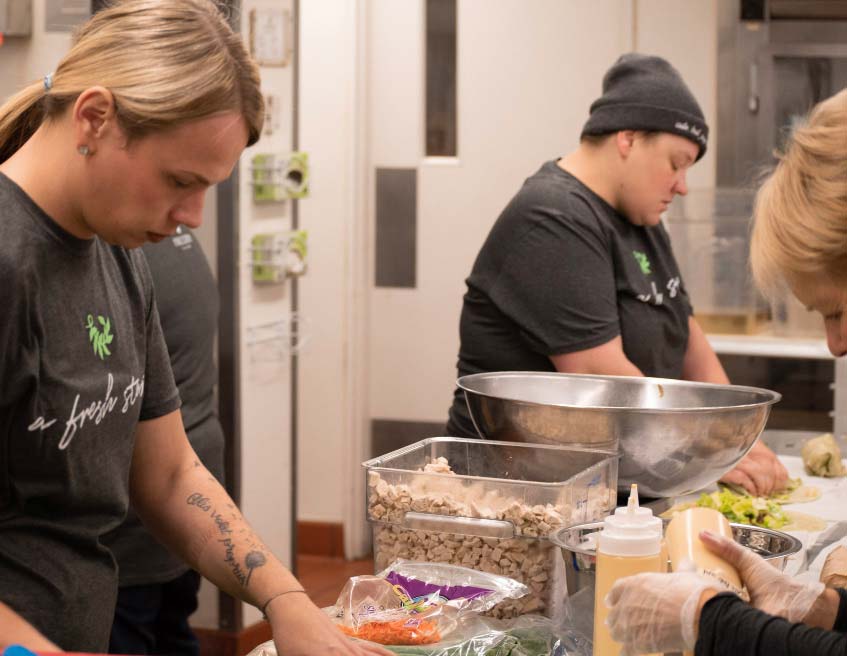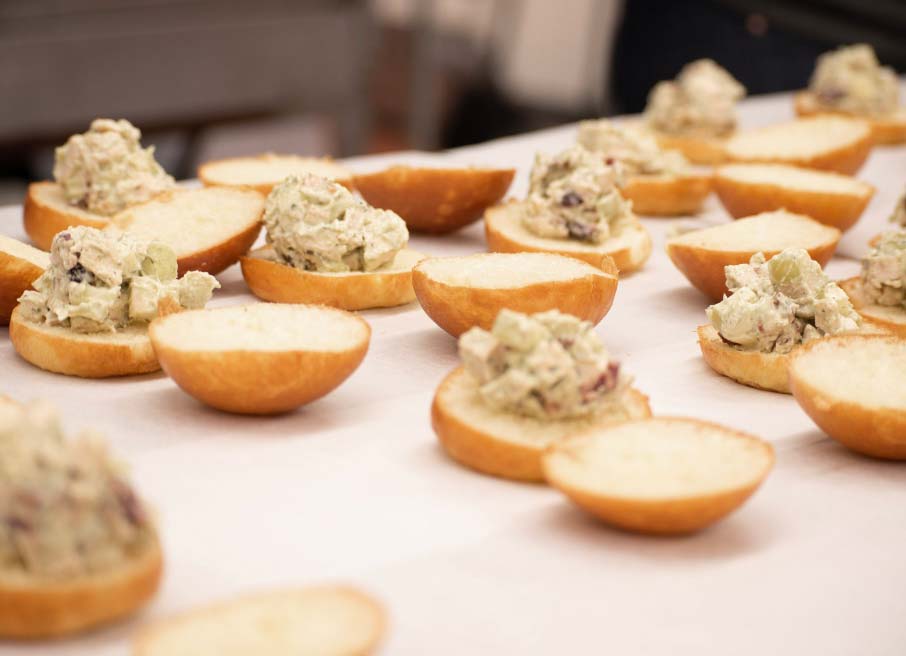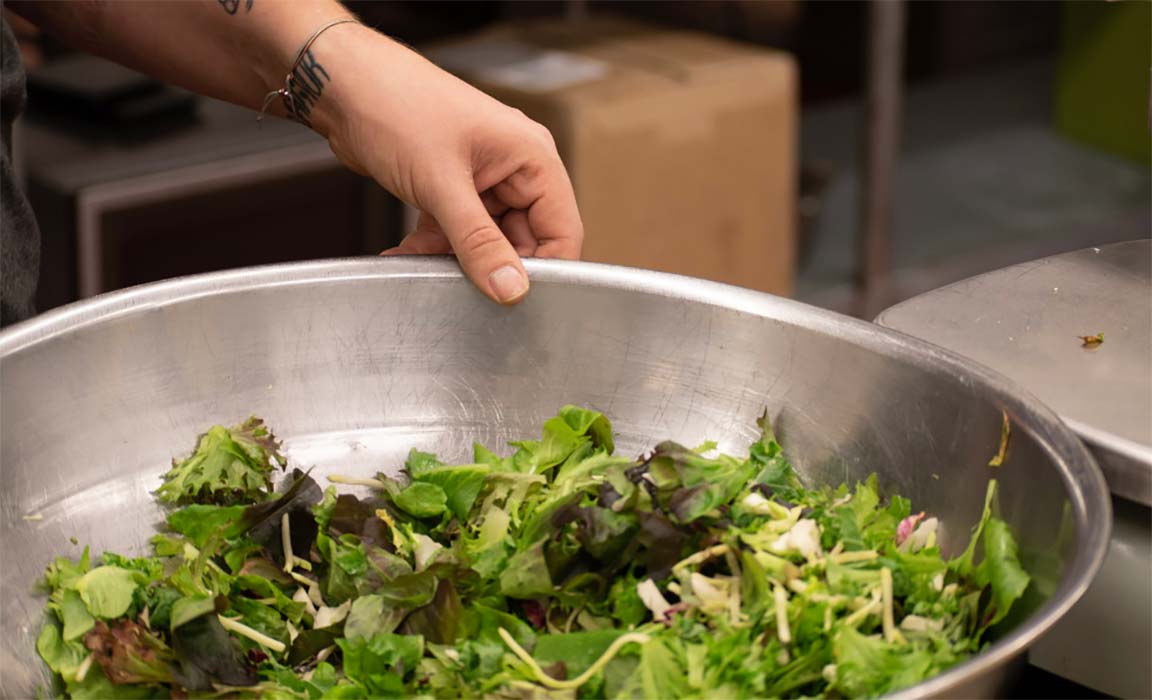Freedom a la Cart
Step into the kitchen of the company voted “best caterer” in Columbus and your eyes are drawn to the many hands in motion. Some are drizzling chocolate over coconut macaroons before they are placed in individual bags. Others are building sandwiches such as the popular Turkey Tango—hand-carved turkey, lettuce, roasted garlic aioli and “secret sauce”—or the Harvest Chicken Salad, made from locally sourced Ohio roasted chicken with pecans, cranberries and apple.
Box-lunch containers lined up along a table are being filled with their various components, soon to be headed for a conference room at Ohio State University, where the luncheon guests will enjoy the fresh, made-from-scratch food.
For any other catering company, delivering that food to people is the end of the process. At Freedom a la Cart, it is but one step on a much longer and challenging journey.
In this kitchen the 10 workers and the kitchen manager are all survivors of sex trafficking, and this job is part of the process of regaining control of their lives. The food they make is widely praised, but there is a larger purpose here: to build a new life of freedom and self-sufficiency. “There are so many benefits from working in a kitchen,” says Paula Haines, executive director of Freedom a la Cart. “Traditionally, that’s where women gather and learn to cook from mothers and grandmothers. That’s where problems are talked through and support happens.
“There’s healing in food.”


The nonprofit organization started 10 years ago by offering support services to the women in Franklin County’s innovative program known as CATCH Court (Changing Actions To Change Habits). The program treats women arrested on prostitution charges as victims instead of criminals. They can have their charges dropped by completing a two-year probation period that includes trauma counseling and drug treatment. They have to remain sober and stay off of the streets.
Haines says the founders of her organization saw that women could do well in the court program but still not be able to find a job. “So we bought a food cart on eBay for $1,200 and pushed that around and sold sandwiches so we could employ survivors,” she says. “That quickly turned into a catering business.”
Survivors learn kitchen skills, but they’re also learning communication skills, how to manage their time and how to get along in the workplace.
“We believe we’re not just training for work in the food industry, we’re training for a good work ethic,” Haines says. “In the past three years, 59 women have come through this program, and 24 of those have transitioned to jobs in the community. And 85% have not received another criminal charge.”
Jess is one of the kitchen workers who came to the program this year, and the pride she takes in her work is evident. “We put out an amazing amount of food with a small group of people,” she says. “It teaches you a lot about yourself.”
For Jess, an important part of this job is gaining confidence in her work and in her life. She works with Freedom’s job coach on skills beyond the kitchen, things as basic as learning to keep track of bills and get them paid on time.
“When you don’t have somebody to help you with that, when you’ve been on the street prostituting yourself for 15 years, you’re lost,” she says. “And then it’s just easier to go get high, and that’s the way people think and the way their mind-set is.”
Recognizing that, Freedom also started the Butterfly Program to offer support services to a larger group of women who are transitioning from treatment to real life, Haines said. Last year they had 77 women in the program receiving case management help, job coaching and other support.
“What these women are really doing is becoming self-sufficient. They’re getting their driver’s license, they’re moving into their own house, they’re getting custody of their kids, getting off government assistance, they’re getting jobs and changing their lives, and that’s what’s exciting,” she says.
In the group’s northwest Columbus kitchen, restaurant veteran and interim chef B.J. Lieberman has spent the last couple of months getting to know the workers and he’s impressed. “Kitchen work is really tough,” he says. “It’s remarkable how resilient everyone is that they can come into these high-stress situations and fit right in.”
The whole staff is celebrating the recent honor of being named “best caterer” in the November issue of Columbus CEO magazine, chosen by vote of its readers. That mirrors the “extremely positive” feedback that Freedom gets from its customers, Lieberman says.
For all the organization has accomplished, Freedom a la Cart has still bigger plans. Haines says they have signed a lease on a Downtown space at 123 E. Spring St. that will become their new kitchen and home base, complete with a café open to the public by next fall.
“We’re excited to get Downtown and open up to the public so that people can actually walk in and enjoy our food,” Haines says. “It’s another way for people to become aware of the sex trafficking issue and get educated, and we hope change will come as a result of that.”
To donate, volunteer or order catering from Freedom a la Cart, visit freedomalacart.org.




